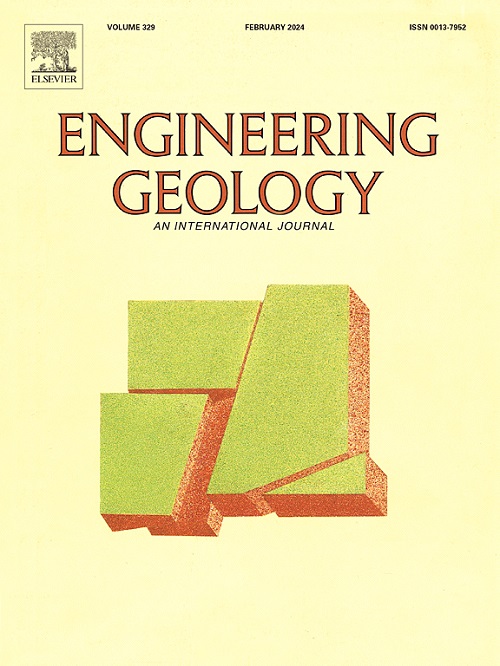OWHK: Operational volumetric water content forecasting model for shallow rainfall-induced landslides in Hong Kong
IF 8.4
1区 工程技术
Q1 ENGINEERING, GEOLOGICAL
引用次数: 0
Abstract
Rainfall-induced landslides result from complex hydrological and geotechnical interactions, with one of the key challenges being the accurate estimation of infiltrated rainfall. This study introduces a unique operational model for predicting shallow volumetric water content (VWC), a critical parameter for assessing rainwater infiltration. Using Hong Kong as a case study, the proposed approach overcomes spatiotemporal limitations in existing predictive models by accounting for the randomness of rainfall-triggering mechanisms. The methodology integrates a unique data preparation technique, independence-oriented time series windowing, with the predictive power of deep learning (DL), specifically, Long Short-Term Memory (LSTM) networks, and deterministic seepage modeling via GeoStudio SEEP/W. The model is developed using field data from 15 sensors across three sites in Hong Kong (Pa Mei, Tung Chung, and Tsing Shan) at two depths (0.5 m and 1.5 m), complemented by a numerically validated case at Fei Ngo Shan Reservoir. 33 field samples were collected from eleven different locations to validate initial hypotheses. This study is among the initial systematic evaluations comparing the accuracy of operational versus site-specific models. The outcome is OWHK (Operational VWC Forecasting Model for Shallow Layers in Hong Kong), a user-friendly tool demonstrating predictive performance with mean absolute error (MAE) below 0.6 %, coefficient of determination (R2) exceeding 0.92, and a mean Monte Carlo dropout standard deviation (SD) of 0.3 %.

香港天文台:香港浅层降雨引发的山泥倾泻的运作体积含水量预报模式
降雨诱发的滑坡是复杂的水文和岩土相互作用的结果,其中一个关键挑战是准确估计入渗降雨量。本文介绍了一种独特的预测浅层体积含水量(VWC)的操作模型,该模型是评估雨水入渗的关键参数。该方法以香港为例,考虑到降雨触发机制的随机性,克服了现有预测模式的时空局限性。该方法集成了独特的数据准备技术、面向独立性的时间序列窗口、深度学习(DL)的预测能力,特别是长短期记忆(LSTM)网络,以及通过GeoStudio SEEP/W进行的确定性渗流建模。该模型使用了来自香港三个地点(帕尾、东涌和青山)两个深度(0.5 m和1.5 m)的15个传感器的现场数据,并辅以Fei Ngo山水库的数值验证案例。从11个不同地点收集了33个现场样本,以验证初始假设。这项研究是比较操作模型与特定地点模型准确性的初步系统评估之一。结果是OWHK(香港浅层运行VWC预测模型),这是一个用户友好的工具,其预测性能的平均绝对误差(MAE)低于0.6 %,决定系数(R2)超过0.92,平均蒙特卡罗偏差标准偏差(SD)为0.3 %。
本文章由计算机程序翻译,如有差异,请以英文原文为准。
求助全文
约1分钟内获得全文
求助全文
来源期刊

Engineering Geology
地学-地球科学综合
CiteScore
13.70
自引率
12.20%
发文量
327
审稿时长
5.6 months
期刊介绍:
Engineering Geology, an international interdisciplinary journal, serves as a bridge between earth sciences and engineering, focusing on geological and geotechnical engineering. It welcomes studies with relevance to engineering, environmental concerns, and safety, catering to engineering geologists with backgrounds in geology or civil/mining engineering. Topics include applied geomorphology, structural geology, geophysics, geochemistry, environmental geology, hydrogeology, land use planning, natural hazards, remote sensing, soil and rock mechanics, and applied geotechnical engineering. The journal provides a platform for research at the intersection of geology and engineering disciplines.
 求助内容:
求助内容: 应助结果提醒方式:
应助结果提醒方式:


